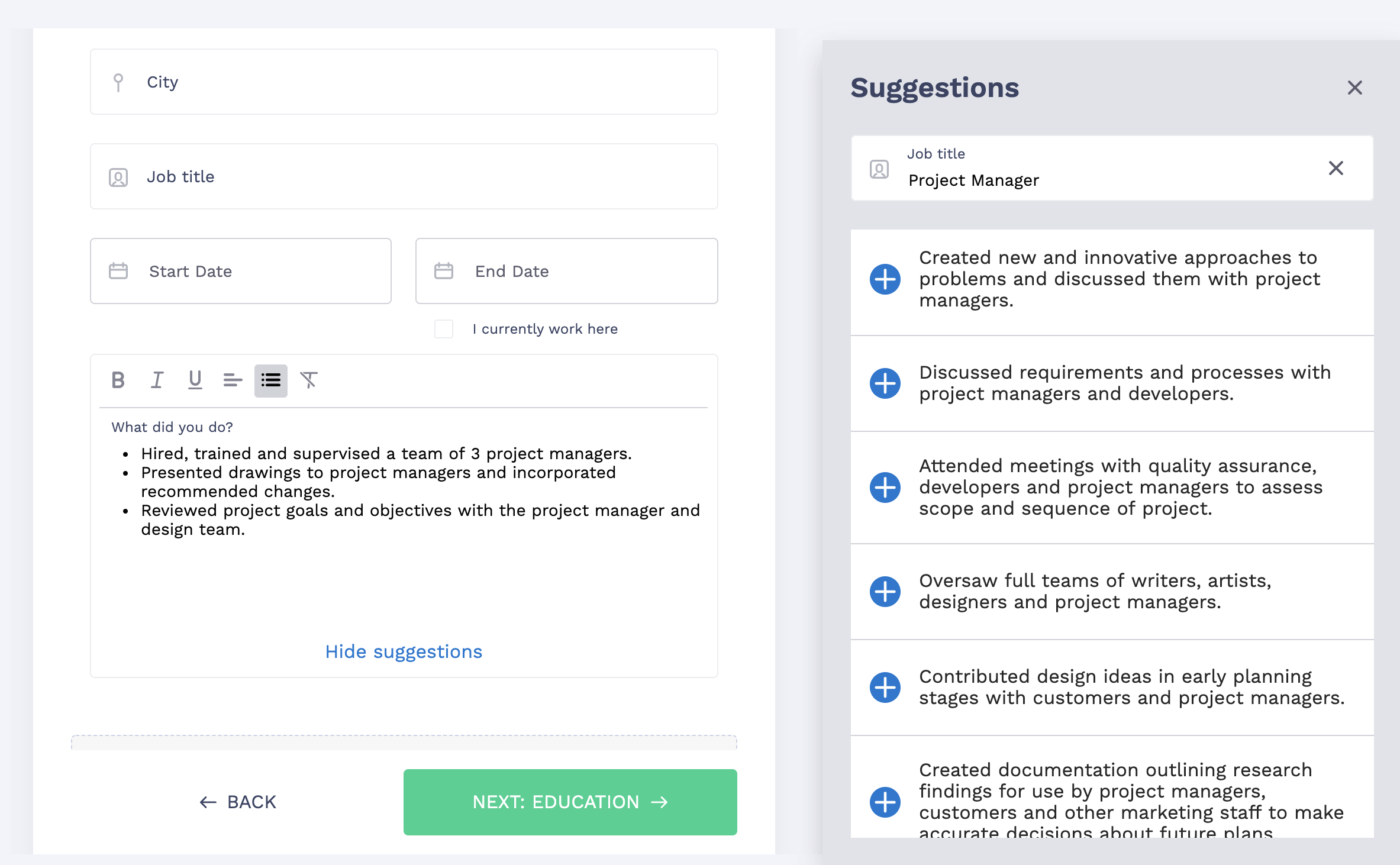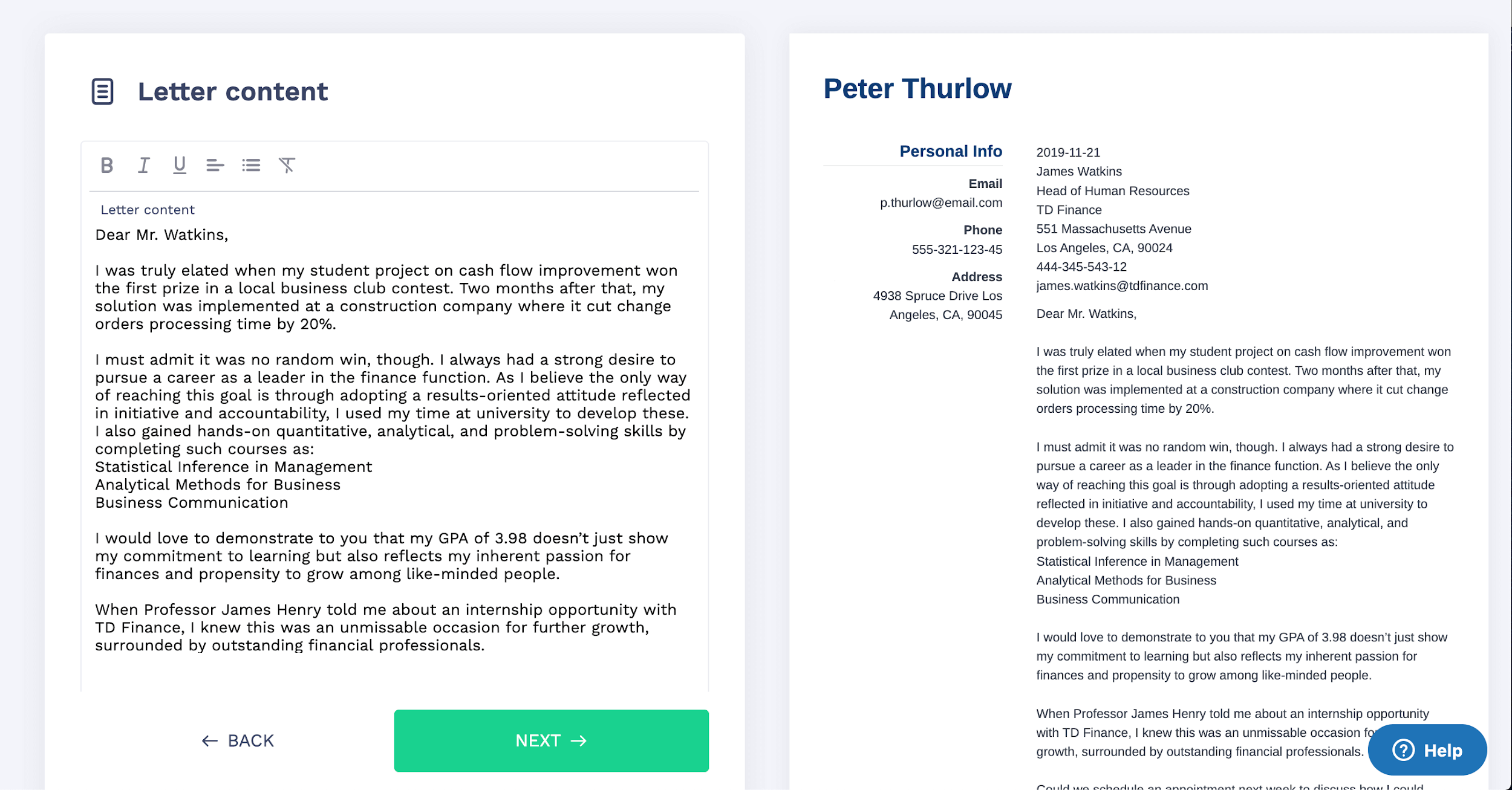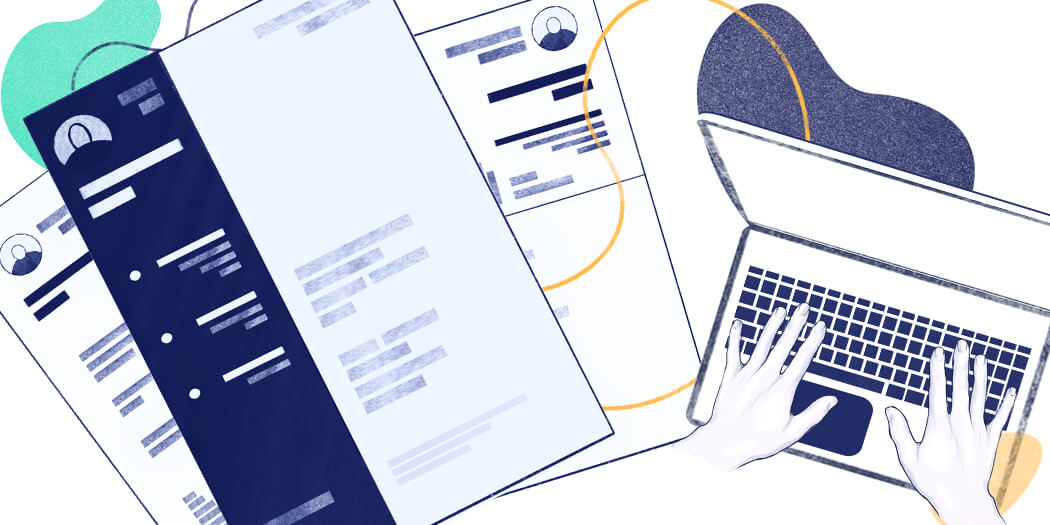
How to Write an Internship Resume: 3 Examples & Guide

Roma Kończak, CPRW
Career Expert
![Accounting Intern Resume for Internship [Example]](https://cdn-images.resumelab.com/pages/accounting_intern_rl_us_header.jpg)
Applying for an internship? You can count on us to guide you through writing an accounting intern resume that adds up perfectly.
As you sit down to write your accounting internship resume with next to no experience, it might feel as if you have zero assets to allocate—
But that’s not true, is it? What about all of your skills and your education? Here’s how to turn what you do have into an accounting intern resume that accrues every recruiter’s interest.
In this guide:
Save hours of work and get a job-winning resume like this. Try our resume builder with 20+ resume templates and create your resume now.

What users say about ResumeLab:
I had an interview yesterday and the first thing they said on the phone was: “Wow! I love your resume.”
Patrick
I love the variety of templates. Good job guys, keep up the good work!
Dylan
My previous resume was really weak and I used to spend hours adjusting it in Word. Now, I can introduce any changes within minutes. Absolutely wonderful!
George
Not quite what you’re looking for? Check out these related articles:
Georgia Wilson
Accounting Intern
248-555-7530
georgia.wilson@reslab.com
Linkedin.com/in/6georgia.wilson
Summary
Detail-oriented third-year accounting student with practical skills in financial report generation, QuickBooks, Excel, data entry, and more. Eager to put my abilities and knowledge to excellent use during a summer internship at Vista Accounting. While working as an accounting intern at 45th Street Accounting Services, automated 4 hours per week, boosting departmental efficiency by 5%.
Work Experience
Accounting Intern
45th Street Accounting Services, Pittsburgh, PA
June 2022–September 2022
Key achievement: Suggested an improvement to the company’s document database update process, automating 4 hours per week and boosting departmental efficiency by 5%.
Education
B.Sc. in Accounting (in progress)
University of Pittsburgh, Pittsburgh, PA
September 2020–June 2024 (expected)
Key Skills
Languages
Accounting interns are students or recent graduates who take on an entry-level role in the accounting department of a company. An accounting internship resume should show you have the basic accounting skills and knowledge to succeed in the role.
Here’s how to write an accounting intern resume that’s balanced perfectly:
When you browse invoices or balance sheets, you know where to look for specific types of information. It makes sense to you that the total amount is on the bottom right, and the customer’s details are somewhere near the top, for instance.
You want to provide the recruiter with the same level of convenience. If they have to search too long for the information they need on your resume, they likely won’t bother—keep in mind, recruiters often have dozens of resumes to go through every day.
So, here’s how to format your resume in a way that’s predictable and easy to navigate for the hiring professional:
Unless the job ad asks for a different format, save your resume as a PDF—it’ll look the same on every device and keep your layout looking as intended.
Rather than delving straight into your experience or details of your education, start your resume with an objective statement that sums up your offer to the employer.
Yep, that’s right—despite the name (and popular opinion), a resume objective statement is not about what you want to achieve in your career: it’s about what you want to achieve for the employer.
Here’s how to structure yours to get your key points across:
If writing your resume profile is starting to look like a major time-sink, skip it for now and come back to it at the end. It’ll be easier to identify your strengths once you’ve put them all down on paper in the other sections of your application.
Alright, don’t worry—
If you have no experience at all, that’s fine too. Employers hiring interns know that applicants are unlikely to have work experience, that’s kind of part of the deal.
With zero experience, you’ll obviously skip this section altogether.
If 100% of your limited experience is unrelated, it makes sense to put your education first and talk about your accounting knowledge before you discuss non-accounting jobs.
The rule of thumb for the order of sections on your resume is simple: the more relevant it is, the higher up it goes. What qualifies you more for the internship: 3 years of studying accounting, or 2 years of working as a barista?
But if you do have relevant work experience, here’s how to present it on your resume—
First of all, at this stage in your career, anything that involved working—paid or unpaid—can go in your resume’s work experience section. That means previous internships, volunteer experience, and unrelated jobs—treat all of them as part of your job history. Just make it clear what type of experience each entry was (e.g., if you volunteered, use the word ‘volunteer’ as part of the job title).
So, in your work experience section, you could have your previous internship, a couple of years of volunteering at a local shelter, and your part-time job in a grocery store. All fair game.
Now, for each of these experiences, you’ll need to write a job description. For best results, target your resume to the job ad—you want to make your experience as relevant and useful for the position as possible.
Here’s how:
By the way, keywords are important for another reason, beyond impressing the recruiter:
Most companies nowadays use Applicant Tracking Systems (ATS) software to parse resumes and score their relevance. By including more keywords from the ad, you’re effectively making your resume appear more relevant to the software that decides whether to pass it on to a recruiter. Pretty important, right?
So, squeeze in a few more of those keywords in your resume’s skills section. Pick up to 10 most relevant ones—and if you need inspiration, check out this list:
Expert hint: Keywords are just one aspect of making your resume ATS-friendly—the template/formatting you use is also important. This is why one of the first steps in this guide involved sticking to plain text rather than tables and graphics—ATS needs to be able to read your resume in full, and many ATS solutions can’t handle images or advanced formatting.
The ResumeLab builder is more than looks. Get specific content to boost your chances of getting the job. Add job descriptions, bullet points, and skills. Easy. Improve your resume in our resume builder now.

Nail it all with a splash of color, choose a clean font, and highlight your skills in just a few clicks. You're the perfect candidate, and we'll prove it. Use our resume builder now.
Your education is among your top assets right now, so it makes sense to invest some time into perfecting the way you describe it on your resume.
A resume education section for entry-level candidates will include two key parts: 1. basic details of your studies, and 2. bullet points describing your achievements and activities.
For the first part, state the name and level of your degree, along with the name of the college and your expected graduation date. This makes it clear that you’re still studying. You can also put ‘in progress’ next to the program name if you want.
The second step offers more flexibility: it depends on your academic strengths. You can list some of the following:
The idea is to show your skills and your potential to succeed. If you have lots of information you could include, consult the job ad once more for the most relevant skills and knowledge.
Finally, if you’re still in the process of obtaining your first degree, mention your high school diploma, too—you only need to state where and when you graduated.
Approaching the bottom line—
Here are a few more things you can include on your resume—they’re optional, but it’s worth adding at least one or two if you can:
One more thing—Make sure to write a cover letter to send with your resume. It’s another opportunity to show your skills to the recruiter, plus it shows you care—which is way more important (and rarer) than you might think!
Double your impact with a matching resume and cover letter combo. Use our cover letter generator and make your application documents pop out.

Want to try a different look? There's 21 more. A single click will give your document a total makeover. Pick a cover letter template here.
Let’s see what it all adds up to—Here’s how to write a resume for accounting interns:
Thanks for reading! Do you have any lingering questions about how to write an accounting intern resume? Perhaps you’re not sure where or how to list your experience? Let us know in the comments section below!
At ResumeLab, quality is at the crux of our values, supporting our commitment to delivering top-notch career resources. The editorial team of career experts carefully reviews every article in accordance with editorial guidelines, ensuring the high quality and reliability of our content. We actively conduct original research, shedding light on the job market's intricacies and earning recognition from numerous influential news outlets. Our dedication to delivering expert career advice attracts millions of readers to our blog each year.


Roma Kończak, CPRW
Career Expert

Thought that creating a resume in Word format is passé? Not if you use one of the top Word resume templates. See the best free and premium Word resumes.

Mariusz Wawrzyniak
Career Expert

Applying for jobs and not getting much ROI? Boost the present value of your applications and impress recruiters with a Deloitte-ready CPA resume.

Dominika Kowalska, CPRW
Career Expert